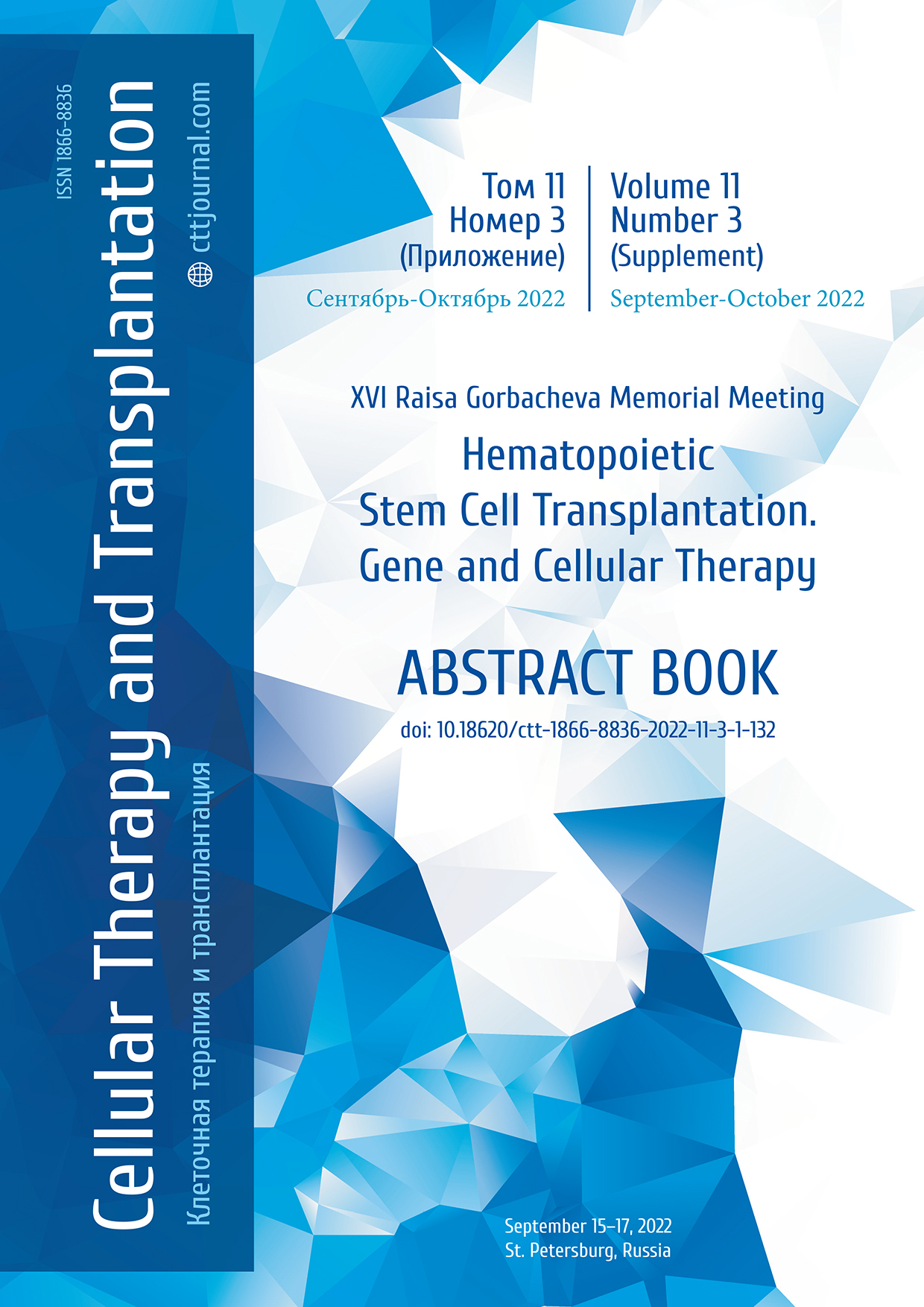AL-03. Gilteritinib as a bridge to allogeneic hematopoietic stem cell transplantation in adult patients with refractory/relapsed acute myeloid leukemia with FLT3 mutations
Bella I. Ayubova1, Sergey N. Bondarenko1, Anna G. Smirnova1, Yulia Yu. Vlasova1, Nikolay Yu. Tsvetkov1, Michail M. Kanunnikov1, Dmitry K. Zhogolev1, Yuliya D. Oleynikova1, Elena V. Karyagina2, Ridvan K. Ilyasov3, Natalya A. Zorina4, Svetlana S. Belyaeva5, Yulia S. Neredko6, Irina A. Samorodova7, Yulia B. Chernih8, Mikhail Yu. Lazarev9, Anna P. Kochergina10, Anna A. Nasredinova1, Ildar M. Barkhatov1, Tatyana L. Gindina1, Ivan S. Moiseev1, Alexander D. Kulagin1
1 RM Gorbacheva Research Institute, Pavlov University, St. Petersburg, Russia
2 City Hospital No. 15 of St. Petersburg, Russia
3 Crimean Republican Oncological Clinical Dispensary named after V. М. Efetov, Simferopol, Russia
4 Kirov Research Institute of Hematology and Blood Transfusion, Kirov, Russia
5 Belgorod Regional Clinical Hospital of St. Joasaph, Belgorod, Russia
6 Stavropol Regional Clinical Oncological Dispensary, Stavropol, Russia
7 City Hospital No. 31 of St. Petersburg, Russia
8 Moscow M. F. Vladimirsky Regional Research Clinical Institute, Moscow, Russia
9 City Clinical Hospital No. 40, Moscow, Russia
10 Regional Clinical Hospital, Barnaul, Russia
Contact: Dr. Bella I. Ayubova, e-mail: bella_ayubova@mail.ru
Summary
Acute myeloid leukemia (AML) with FLT3 mutations is associated as subtype of AML with higher relapse rate, shorter remission period, decreased survival. Mutations in FLT3 can be considered as a promising molecular target for the treatment of patients with FLT3-mutated AML, particularly refractory or relapsed (r/r) AML. Allogeneic hematopoietic stem cell transplantation (allo-HSCT) as consolidation of second remission improves three-year overall survival from less than 10% to 50%. Our aim was to evaluate the outcomes after gilteritinib therapy in adult pts with r/r AML.
Patients and methods
52 pts with median age 54 (18-79) years were included in the analysis, and 17 of pts were older 60 years old. Status of AML before therapy was as follows: primary refractory – 15 (28.8%), secondary-refractory – 5 (9.6%) and relapsed – 32 (61.5%). Pts with secondary AML were observed in 19.2%. The ITD mutation was detected in 88.5% and TKD – mutation in 11.5% of cases. Patients received gilteritinib 120 mg once daily, mostly 1 or 2 of the 28-day cycles of therapy (59.6% and 25%, respectively).
Results
Overall response (OR) rate was in 41 (78.8%) pts: complete remission (CR) was documented in 32.7%, remission with incomplete recovery (CRi/r) 23.1% and morphological leukemia-free state were also observed in 23.1%. Allo-HSCT was subsequently performed in 28.8% of all treated patients. The median age of this group of patients was 39 (18-68) years. The median time from OR after gilteritinib to allo-HSCT was 45 (8-156) days. Median follow up was 16.5 (7.0-26) months. Median of two-year overall survival (OS) was 6.9 ((95% CI: 5.2-14.9) months and disease-free survival (DFS) in the group of patients who achieved remission was 19 (95% CI: 8,4 – ∞) months. By the multivariate analysis, event-free survival was significantly associated with successful bridging to allo-HSCT (HR=0.3; CI 95%: 0.1-0.7; p=0.08). The most common complication was hematological toxicity: neutropenia 4 gr. – 78% with median duration 36 (4-325) days and thrombocytopenia 4 gr. – 56.1% with median duration was 55 (4-325). Sepsis/bacteremia was observed in 31.8% and bacterial pneumonia – 13.6%. Of the specific complications of Gilteritinib, the most frequently observed were edema (15.2%), myalgia/arthralgia (15.2%), dry skin/itching (12.1%). Therapy-related mortality: No unexpected toxicity was observed after therapy. Therapy-related mortality was 3.8% (2 causes – infections).
Conclusions
Gilteritinib in patients with r/r FLT3-mutated AML demonstrated favorable outcomes with satisfactory tolerance to therapy. Thus, gilteritinib can be used as a bridge to allo-HSCT in adult patients with r/r FLT3-mutated AML.
Keywords
Acute myeloid leukemia, target therapy, gilteritinib.


